Quadro RTX 6000 vs A6000: Which GPU Reigns Supreme?
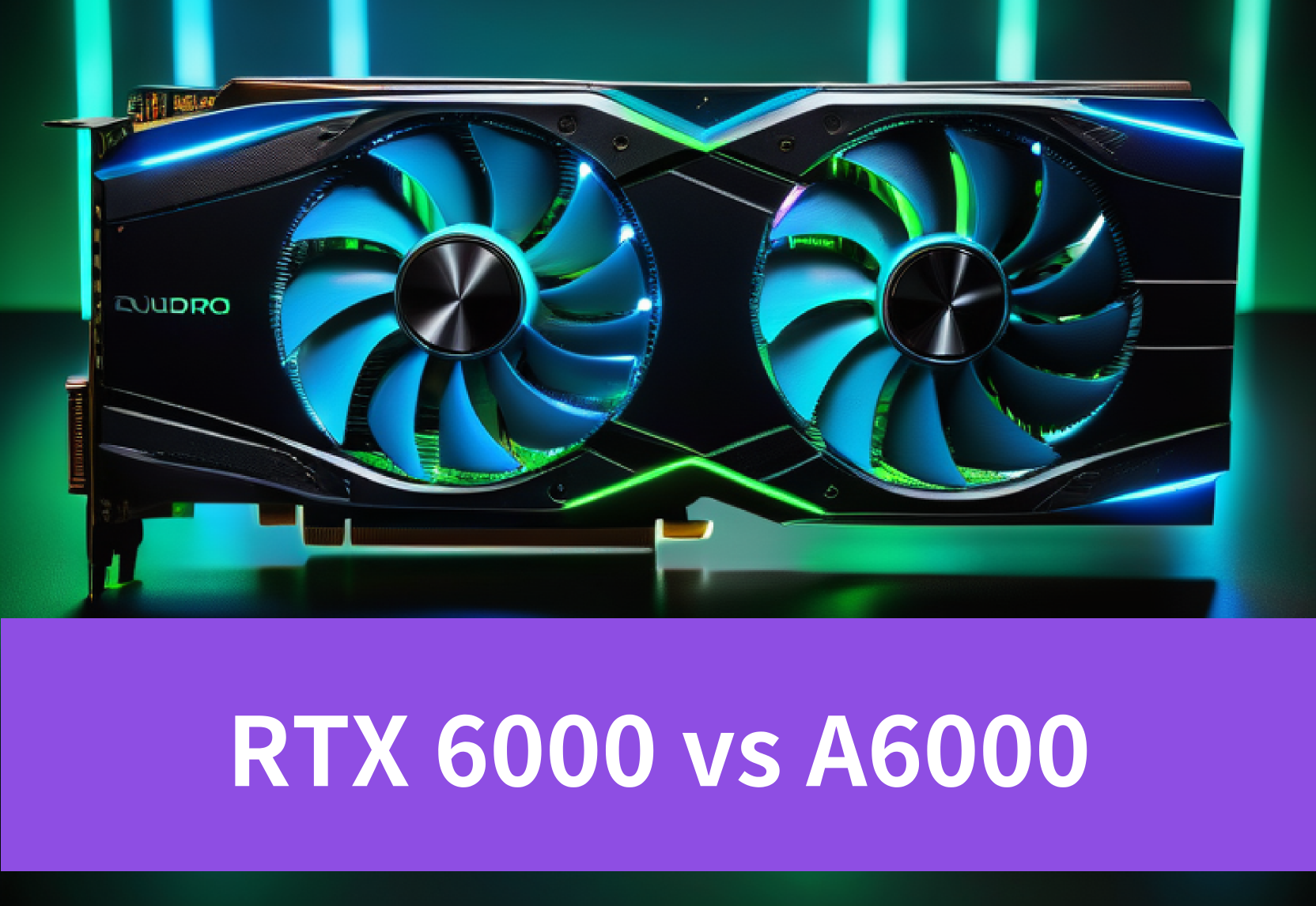
Introduction
The NVIDIA Quadro RTX 6000 and A6000 are two of the best GPUs for high-end graphics. They’re built for professional workstations, with great performance and features. These GPUs are perfect for folks in fields like architecture, engineering, visual effects, and scientific research who need extra power. Today’s chat is about comparing the Quadro RTX 6000 and A6000 to see which one is better.
Unveiling the Contenders: Quadro RTX 6000 and A6000
The NVIDIA Quadro RTX 6000 and A6000 graphics cards are great for people who need powerful graphics in their workstations. These GPUs are perfect for 3D, ray tracing, AI, and deep learning.
Overview of Quadro RTX 6000
The NVIDIA Quadro RTX 6000 is a top-of-the-line workstation GPU built on the Ada Lovelace architecture. It has 18,176 CUDA cores to handle complex tasks. This card has 142 third-generation RT cores for ray tracing and 568 fourth-generation Tensor cores for AI and deep learning. The Quadro RTX has 48GB of memory and a bandwidth of up to 960GB/s, making it perfect for professionals who need reliable power.
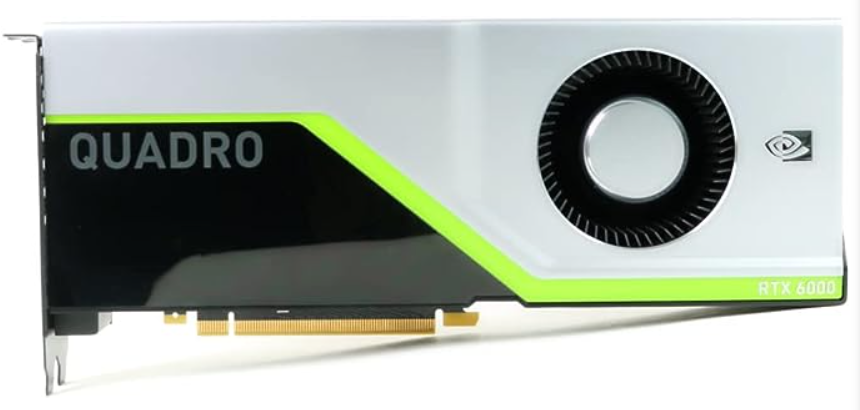
Overview of Quadro RTX A6000
The NVIDIA Quadro RTX A6000 is a top-notch workstation GPU built on the Ampere architecture. It has 10,752 CUDA cores, which means it can handle professional tasks well. This card has 84 second-generation RT cores for real-time ray tracing. It has 336 third-generation Tensor cores for AI and deep learning. The Quadro RTX A6000 has 48GB of memory and can handle high-performance tasks smoothly. It’s ideal for engineers, scientists, and content creators who need high-performance hardware.

Core Specifications Compared
Quadro RTX 6000 and A6000 differ primarily in memory and bandwidth and cooling and power consumption.
Memory and Bandwidth
Memory bandwidth is a critical factor in determining the overall performance of a GPU. The Quadro RTX 6000 offers an impressive memory bandwidth of 960GB/s, which allows for faster data transfer and processing. It comes with 48GB of GDDR6 memory, providing ample space for handling large datasets and complex rendering tasks. On the other hand, the A6000 offers a memory bandwidth of 768GB/s and also comes with 48GB of GDDR6 memory.
The table below provides a detailed comparison of the memory and bandwidth specifications of the Quadro RTX 6000 and A6000.

CUDA Cores and Ray Tracing Capabilities
CUDA cores and ray tracing affect how well a GPU performs. The Quadro RTX 6000 has 18,176 CUDA cores that help do many tasks at once, making complex scenes render faster. This card can handle real-time ray tracing, making lighting and reflections look more lifelike. It also has 568 fourth-generation Tensor cores for better AI and deep learning. The Quadro RTX A6000 has 10,752 CUDA cores and 84 second-gen RT cores. Both GPUs are great for professional work.
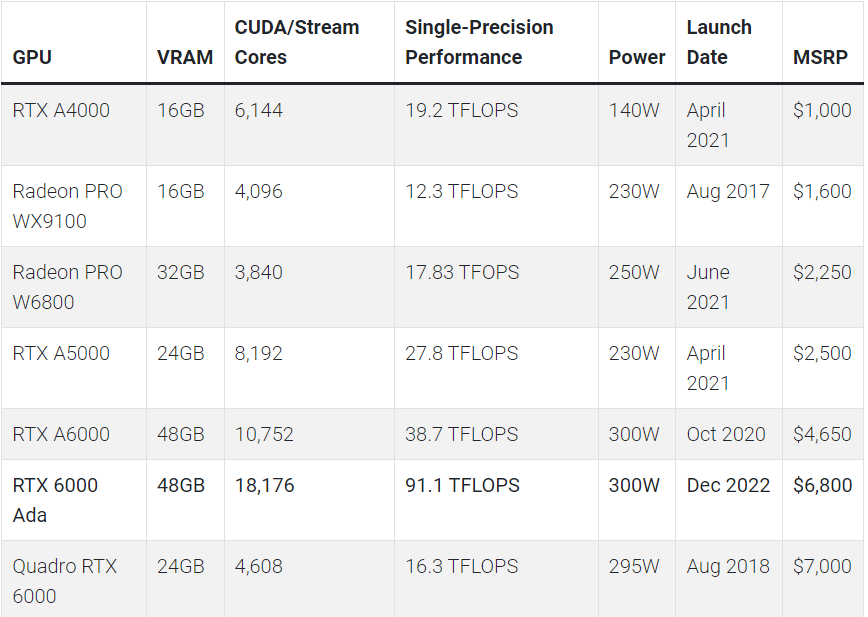
Performance Metrics: Real-World Applications
To see how good the Quadro RTX 6000 and A6000 are, we look at benchmark results and tests from actual use. These GPUs shine in jobs like making 3D images, running simulations, and putting together visual effects.
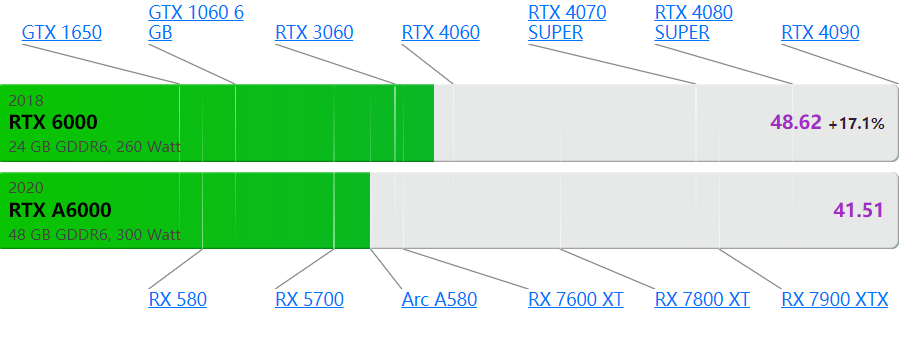
Benchmarking in Professional Workflows
Benchmarking is a key step in figuring out how well GPUs work for professional tasks. When looking at the Quadro RTX 6000 and A6000, running benchmark tests with popular tools like Unreal Engine tells us a lot about what they can do. From these benchmark results, we learn that these GPUs are great at providing smooth experiences for professionals.
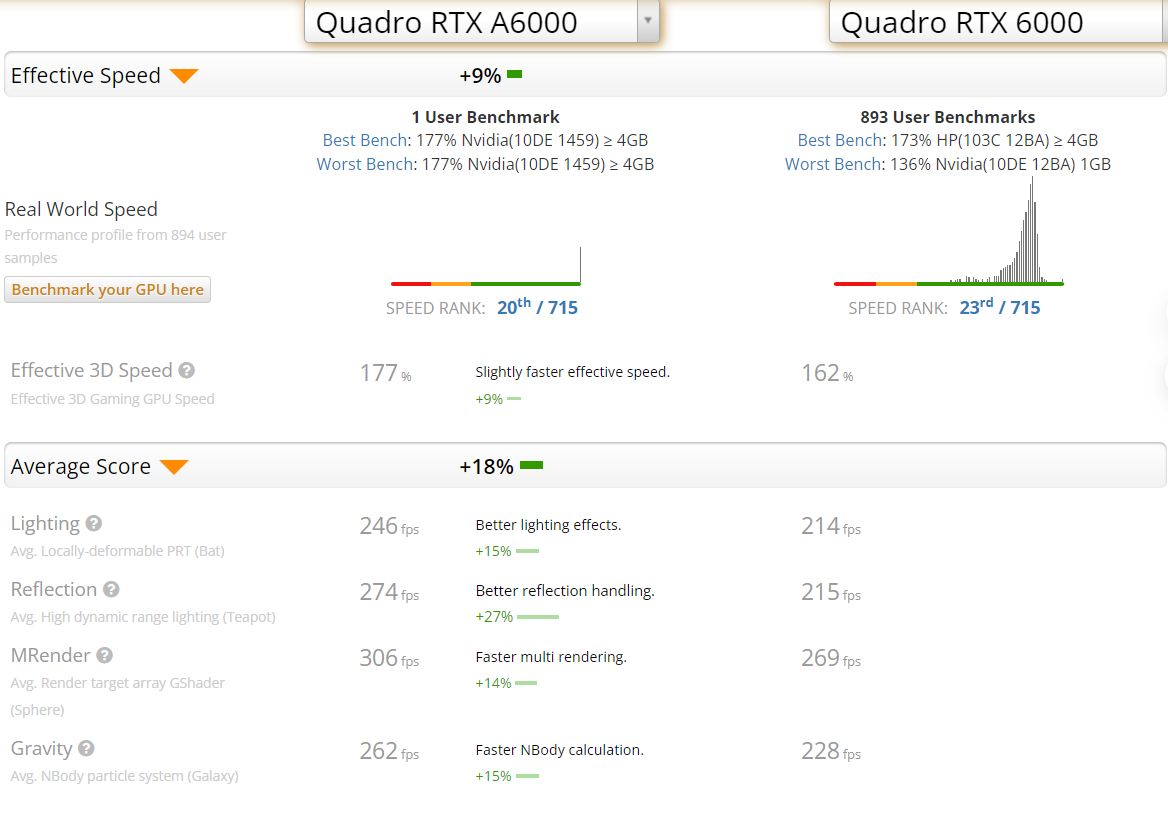
Rendering Performance
In the world of professional workstations, being able to quickly and accurately render complex scenes and top-notch graphics is key. The Quadro RTX 6000 and A6000 are stars in this arena, thanks to their beefy GPUs and smart design. They’re packed with a ton of CUDA cores along with real-time ray tracing capabilities, making them perfect for heavy-duty rendering tasks without breaking a sweat. For folks working on architectural designs, movie visual effects, or creating 3D models for games, these GPUs from Quadro ensure everything runs smoothly and efficiently.

AI and Deep Learning Efficiency
The Quadro RTX 6000 and A6000 have these really cool Tensor cores that make AI and deep learning jobs go faster. These GPUs use a bunch of CUDA cores working together and a special setup to be really good at doing AI tasks efficiently. If you’re into training brain-like networks, running big simulations or looking through huge amounts of data, the Quadro RTX 6000 and A6000 have got the muscle for it.
Industry Use Cases
The Quadro RTX 6000 and A6000 are really useful in a bunch of different fields, like making buildings look real before they’re even built, helping movie makers edit their films smoothly, and assisting scientists with their experiments.
Architectural Visualization and Construction
The Quadro RTX 6000 and A6000 GPUs are game-changers in building and designing. These GPUs let architects see their ideas come to life in amazing detail right before their eyes without having to wait. They have lots of memory and CUDA cores, so they can handle complicated designs and simulations easily.

This makes it easier to create lifelike images or walk through your design virtually. Everyone can understand what’s going on and make smart choices. Architects and construction workers need high-performance graphics cards for visualization and modeling.
Media, Entertainment, and Broadcasting
The Quadro RTX 6000 and A6000 GPUs are ideal for media, entertainment, and broadcasting professionals. These GPUs are great for video editing. You can work with high-res footage and complex visual effects without struggling. Users can play back videos smoothly and edit them in real time with lots of memory and CUDA cores.
This boosts productivity and creativity. Ray tracing makes scenes look better visually. The Quadro RTX 6000 and A6000 are great for professionals making movies or virtual reality experiences.
Scientific Research and Simulations
For heavy-duty science simulations like physics, chemistry, and engineering, you need a strong GPU. The Quadro RTX 6000 and A6000 are the answer. They can handle big data and complicated math fast. Scientists can get through their work quicker, from simulating liquids to predicting the weather. These GPUs are great for serious scientific research that needs a lot of computing power. They’re fast and reliable.

Enhancing Efficiency with Novita AI GPU Instances
After comparing them, you probably know which one to choose. You might be put off by the price of each GPU. Why not have a brand-new perspective to make use of excellent GPU resource without the high cost upfront? Novita AI GPU Instance offers you this possibility! Novita AI GPU Instance offers a robust a pay-as-you-go platform for developers to harness the capabilities of high-performance GPUs.

By choosing Novita AI GPU Instance, developers can efficiently scale their A6000 resources and focus on their core development activities without the hassle of managing physical hardware.
Only 4 Steps to Deploy A6000
Deploying the NVIDIA A6000 GPU on the Novita AI GPU Instance platform is a straightforward process that involves several key steps. Here’s a detailed guide on how to successfully set up and start using an A6000 GPU instance on Novita AI:
Step 1: Create an Account with Novita AI
Visit the Novita AI GPU Instance and click on the “Log In” button. You can log in with Google Account or Github.
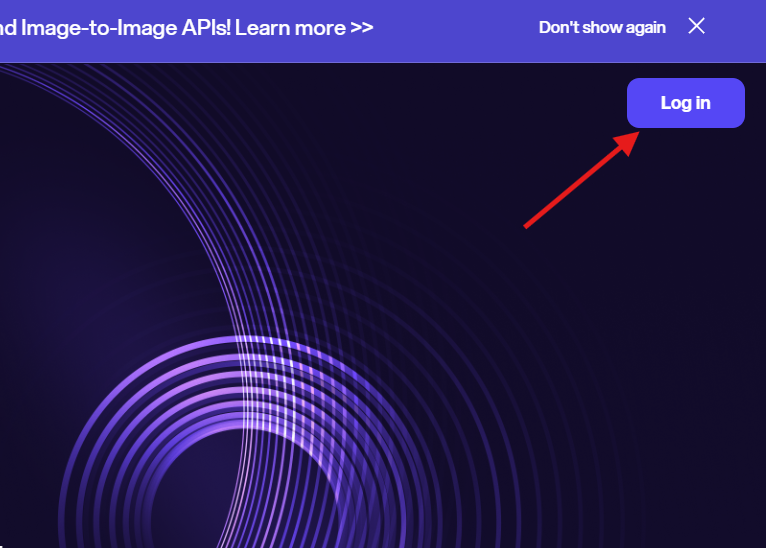
Step 2: Access the Dashboard
Once logged in, navigate to the Console to manage and deploy GPU instances.
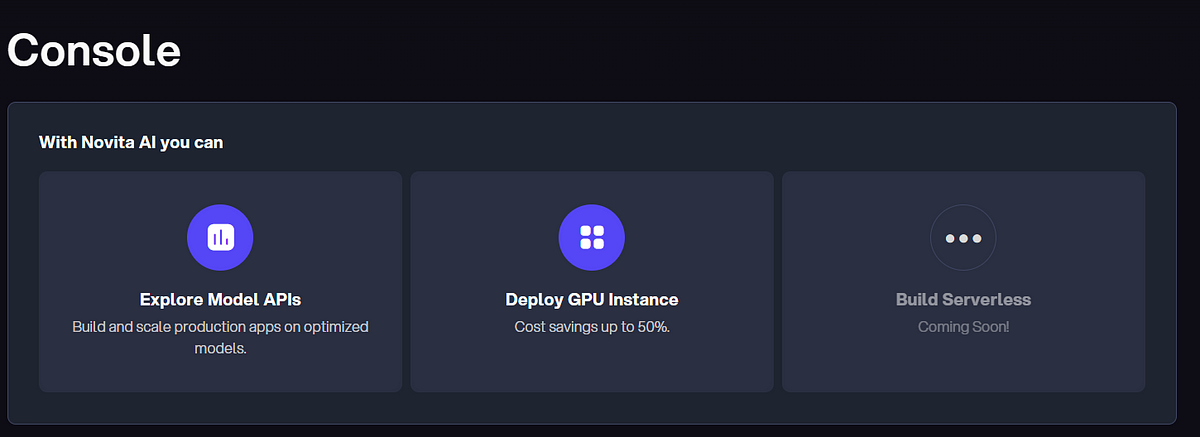
Step 3: Configure Your GPU Instance
- Select the NVIDIA A6000 from the list of available GPU types.
- Choose the hardware configuration that suits your need, such as the amount of memory and CPU cores.

- Select the operating system image or template from the provided list.
Step 4: Start Your Project
Once everything is set up, you are ready to begin uploading your data and running your applications on the powerful NVIDIA A6000 GPU.
Conclusion
To decide which GPU is best, look at their main features, specs, performance, and usability. If you need lots of memory and fast data transfer or lots of CUDA cores for complex calculations and ray tracing, these GPUs have something for everyone. They’re designed for heavy-duty tasks like making 3D models look real or helping computers learn from data. Think about how well they stay cool, how much electricity they use, whether your software will work with them, and if you can get help with drivers. These GPUs are used in many fields, including architecture, film, TV, and science. Pay attention to the details to pick the right GPU for your needs.
Frequently Asked Questions
Which one is better for gaming, RTX 6000 or A6000?
The RTX 6000 is a gaming graphics card, while the A6000 is a professional graphics card. So RTX 6000 is better.
Are there any specific software requirements for utilizing the full potential of RTX 6000 or A6000?
RTX 6000: CUDA Toolkit and Drivers, Graphics Applications, Deep Learning Frameworks, Virtualization Platforms
A6000: CUDA Toolkit and Drivers, Professional Applications, Deep Learning Frameworks, Virtualization Platforms
Can both RTX 6000 and A6000 support multiple monitors simultaneously?
Certainly! Both the RTX 6000 and A6000 offer excellent multi-monitor support, with the A6000 providing even more flexibility with its six mini-DisplayPort connectors.
Novita AI is the All-in-one cloud platform that empowers your AI ambitions. Integrated APIs, serverless, GPU Instance — the cost-effective tools you need. Eliminate infrastructure, start free, and make your AI vision a reality.
Recommended Reading: